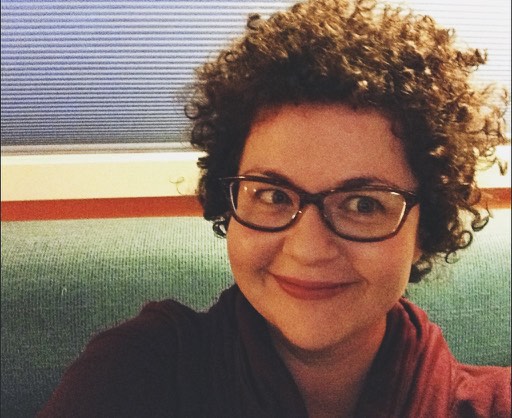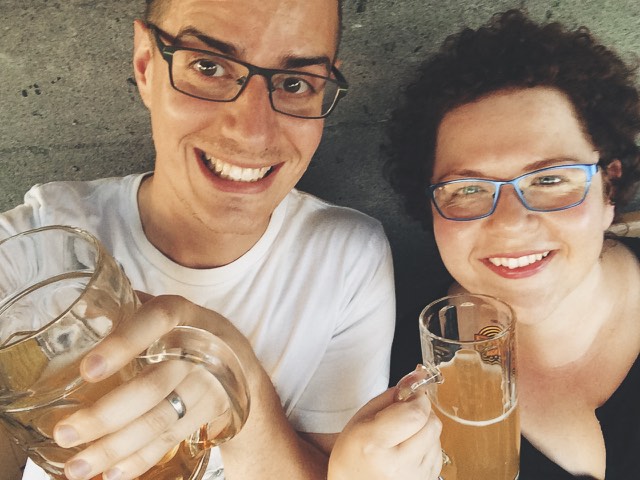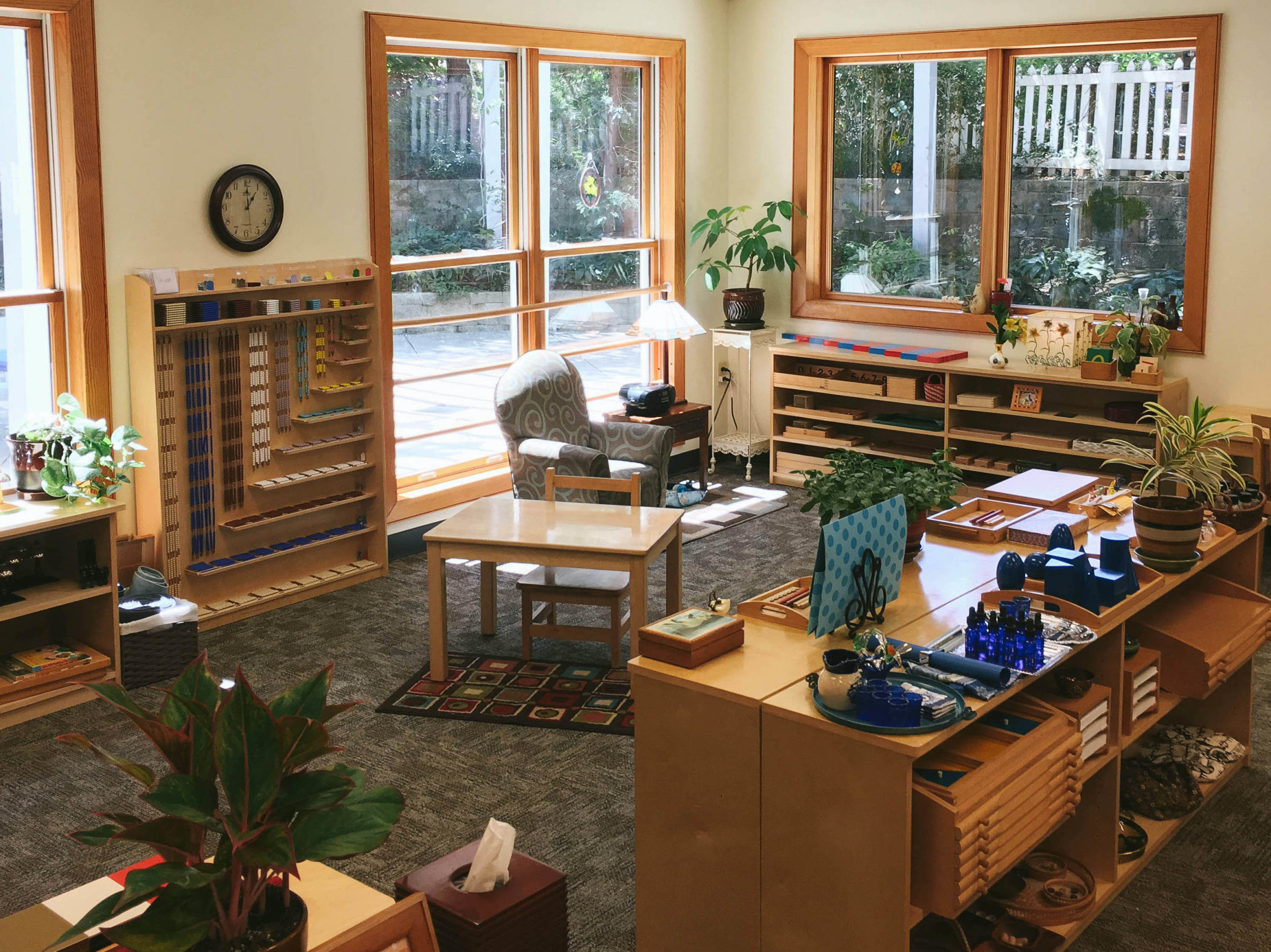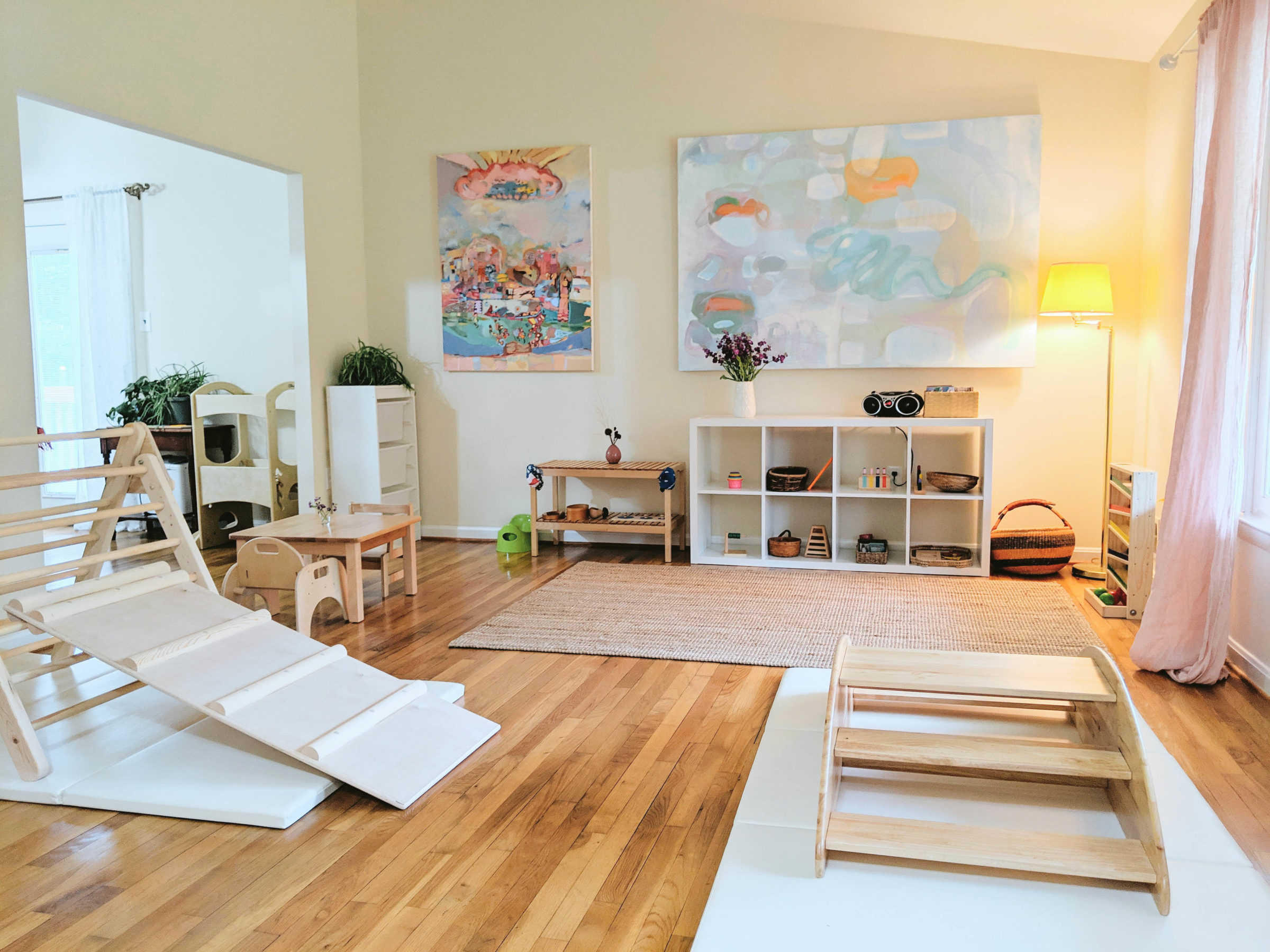Spotlight Sally Coulter
Spotlights
We are overjoyed to Spotlight Sally Coulter, who has a very interesting story. Originally from Australia, her background in Montessori began in Japan, continued in Portland at the training center and in the classroom, and has an awesome, witty, humble, fun presence online. But we hardly do her story justice; let her tell you, in her own words.
Q: Can you tell us a little bit about yourself? Your background, your interests, your dreams?
I was born in Adelaide, Australia, where I lived until I was 22. In 2000, I moved to Aomori, Japan, to teach English in a small mountain town called Sannohe, where I lived for two years. Moving to Japan was like that moment in The Wizard of Oz where the tornado picks up Dorothy’s house and drops it down in Oz. When everything is still, she creeps to the front door, opens it, and the black and white monotony of Kansas has been replaced with bold, beautiful technicolor. Japan was Oz for me.
Adelaide was a great place to grow up, but Japan was so, SO different to anything I’d known. Everything – the smells, sights, noises, daily patterns, etiquette, seasons, even the light – was exotic and unfamiliar. Being there woke me up to my own cultural lens; that realization that what was “normal” to me was just a matter of culture. My cultural norms wouldn’t make sense to someone from a different culture. Likewise, Japan didn’t make sense to me. I arrived there thinking that the world revolved around me and my needs. I left Japan realizing my smallness in the world and how nobody owed me anything. It was a humbling and wonderful experience. If a person has the opportunity to live abroad, they should take it.
While in Japan, I met and fell in love with Brent Miller, an uber-nerd with whom I shared a love of crass humor and curiosity about things. We got married in October 2002 in Santa Barbara, CA, where Brent was going to grad school to study evolutionary biology. Despite his love of and aptitude for the topic, the frustrations of the academic lifestyle led instead to a career as a web developer. That path led us to Portland, where we moved in 2006, adopted two cats, and settled into a simple life.
I worked at Montessori Northwest, an AMI teacher training center, from 2007 – 14, and I’ve been at the Montessori School of Beaverton since August of 2014. Both are wonderful places to work, and have given me a creative outlet in the form of making classroom materials: cards, aprons, pouches, trays, color tablets… so many fun projects. I’ve always gravitated towards work that’s creative and manually dextrous, whatever “craft project of the month” that happens to be. I love doing any kind of crafty project. I’m a dreadful dabbler. I’ve never really mastered anything, but because of my lifelong history of crafting and creating, I can turn my hand to fine motor skills fairly quickly. I’m also a great starter, but a terrible finisher, so my cupboards are bulging with unfinished craft projects that I’m sure I’ll get around to someday [shifty eyes].
Q: Now that the hardest question is out of the way: What’s your favorite color?
I’m quite partial to a deep, dark, saturated blue with a hint of purple in it. Brent once bought me some Thai silk in that color and I’ve been too hesitant to use it for anything so it stays unused. I also love dark teal.
Q: Do you have a favorite book? How about a film?
The BBC extended-edition miniseries of Pride and Prejudice starring Colin Firth. Swoon. Any novels by Brandon Sanderson, Joanna Bourne, Scott Lynch, Patrick Rothfuss, China Mieville, or Julia Quinn. So that limits us to swashbuckling magical fantasy and romance novels. I’m not one of those folks who can read non-fiction. That’s work, and I’m a lazy reader.
Q: When you close your eyes late at night, and imagine waking up and starting a new adventure: what is that adventure?
To be honest, I’m not adventurous. I dig the home life. I like the idea of travel, but I dislike change, so in reality travel isn’t fun for me. My adventures lie a little closer to home: new hobbies, especially a new crafting adventure. I dream of someday persisting in learning a new skill to the point where I actually master something. That would be an adventure for me.
Q: What first appealed to you about Montessori?
Montessori feeds the immediate developmental needs of each child, and it’s that immediate part that’s most interesting to me. It’s an approach that offers children a way to scratch the math itch when they’re feeling math, or scrubbing, or writing, or weeding.
“ Conventional education says that you have to feel math when it’s math time. What if you don’t? ”
What if you feel poetry, or running, or embroidering? The free choice element is so key, because it makes learning an enjoyable, almost effortless experience. It means, in the words of trainer Rita Schaefer Zener, that you can “ride the horse in the direction it’s going”. You don’t have to spend all your energy getting it to walk in any particular direction. The genius of Montessori is that it says, “Okay, this kid wants to do X, so let’s just roll with that pre-existing interest and make it a learning experience while we’re at it”.
Q: You have taken the training, you worked at the Montessori Northwest training center, and now you’re an assistant in a classroom. Can you tell us a little bit about your Montessori journey?
Montessori came to me slowly, starting in Japan. Several unconnected people in my life had independently mentioned it to me with great enthusiasm. I did some research, and realized I’d found a way for me to teach without being in the public teaching sector. My mum had been a public teacher, and I watched it grind her down. She loved the work but the system was a source of immense frustration and disappointment. I’d taken care to avoid the teaching profession my whole life, but here was a way to be a teacher and like it. I kept that dream bubbling for a few years until we decided to move to Portland for Brent’s job in 2006. It turned out that there was a well-regarded Montessori training center in Portland, so it felt like the stars were aligning between me and Montessori.
I applied for and was accepted to the AMI primary training at MNW, where I began to know and understand the Montessori approach to children, how they learn, why they learn, why they are the way they are. It struck me deeply, how the consequences of a child’s early-life experiences will remain with them, to their benefit or detriment, for the rest of their lives. Towards the end of the course, I applied for the position of the outgoing primary course assistant, Corinne Stastny, who was moving to the Bay Area. I got the job, and was thrilled to stay on at MNW helping trainer Ginni Sackett (and later also Sarah Werner Andrews) run the primary training course. I did it for five years. Until I started in the classroom, it was the hardest and most rewarding thing I’ve ever done.
After moving into a more administrative position at MNW following a few really intense years in a row, I started to feel the tug of working with children. It was a strange position that I was in: I’d deepened my understanding of the Montessori theory through working at the training center, but I still hadn’t applied it in any direct way with children. I felt as though something very important had been left unfinished, and only being in the classroom would complete it. A friend mentioned that an assistant position had opened up at a Portland school I respected highly, with a teacher I held in very high regard. I applied and was lucky enough to be offered the job. From there, I finished up seven great years at MNW and then started in the classroom as assistant to Robin Myers at the Montessori School of Beaverton. I wrote about my experiences on the Facebook page Montessori Assistant (check it out here) It was a helpful way for me to explore this bridge between theory and practice. Every day was a universe of learning.
This year, I’m working at the same school with a new teacher, the wonderful Nora Mix. I’m lucky to have had such positive models for patient, loving, and authentic Montessori practice.
Q: Is work in the classroom different than what you expected?
Yes. Definitely. I had no idea how much of it would involve constant self-monitoring and self-control of my actions and reactions. Dr. Montessori talked about the ideal of the transformed adult, this graceful, reliable presence who would know what to do, how to reach the child, would respond appropriately, all in the service of the universal child with the final goal of world peace. It’s a very lofty ideal, and I feel the weight of it a lot, and how far I am from it. I think that many Montessorians feel a weighty responsibility in this job. It makes us one of the most self-critical professions.
Q: What advice do you have for new Montessori adults?
Observe, observe, observe. Observe yourself. Observe your reactions and your words and your tone. Observe the children, don’t make assumptions. This is a scientific educational approach, which means that we gather data before we act. Observing is our frontline form of data-gathering.
Also, listen. When I was first in the classroom, literally in my first days, I felt frantic with the feeling that everything was going to fall apart if I didn’t control it all at every moment. This made me distracted around the children, and I only half-listened when they spoke to me. My guide noticed this, and mentioned it to me. “You need to listen to them when they talk to you. Be aware of the room, but listen to them”. Following her advice, I started to do this consistently. When a child would say, “You know what, Sally?” or “Can I tell you something?” I would get down to their level, look them in the eye, and show them with my body and face that I was listening. The children immediately began to like me more and listen better when I spoke to them. They also shared some amazing, hilarious, sad, inspiring stories with me, stories I’d never had heard if I hadn’t started to listen attentively to them. So… listen.
Q: Did you have a “Montessori Moment?”
I’ve had many, but one sticks out in my memory. I was having a particularly hard day in the classroom, entirely my own fault. I’d been firmly (and rightly) told by my guide to stay in my seat and not to help the children unless there was a safety issue or a material was being damaged. This was in response to me getting up constantly to “help” rather than letting the other children or the environment itself provide the necessary correction. My “helping” was actually hindering that settling-down of the classroom in the early months. It was preventing the children from adhering into a cooperative group, and it was giving them impression that we didn’t trust them.
Needing to make something good out of this difficult experience, I started a list: “Things that fixed themselves because I did not intervene”. For several hours, all I did was observe, noting all the little “problems” and “mistakes” that children either worked out for themselves, or asked friends to help with, and all because I didn’t jump in to help. The classroom became calmer, the older children were proud to have the opportunity to step up and help, the younger children learned how to find the help they needed. My list got longer as I realized what a hindrance my unnecessary intervention had been. That was a big day of learning for me.
Q: What’s your favorite Montessori quote?
There are so many that are beautiful and insightful and poetic, but the one that is tattooed on the inside of my brain, and applies to me the most meaningfully, is “Every unnecessary help is an obstacle to development”. I say this to myself many times a day when I feel the urge to jump in and assist when assistance is not needed.
Q: What do you think is the best introduction to Montessori?
Observe in the classroom of a good school, for as long as you’re able. It’s so necessary to see it action. At a recent parent night at our school, some of the parents were talking about their first experience seeing Montessori in action, and they used words like transformative, mind-blowing, eerie, unexpected. To see it working, the children engaged and calm, the teacher on the periphery or gently guiding… there’s no substitute.
Q: What continues to inspire you about Montessori?
I’m inspired by how respectful it is. I hear the way people sometimes talk to children in public, they belittle their lack of experience in the world, and disparage their attempts to contribute. Of course children do things imperfectly! They’re new at everything! If a friend broke a glass at our home, we’d brush off their apologies and tell them everything was fine, don’t worry about it. But a child would get yelled at and told to be more careful. We have a double standard in which children are somehow expected to better than adults with less experience of the world. Montessori has high expectations but offers respect, even when something is broken. I see how children respond to that respectful manner and tone. It’s often new to them, and they are drawn to it, and this allows us to work with them and help them.
Q: In what ways do you envision the future of education?
I wish I could say I was more optimistic about the future of education. My ideal would be for government to fund high-quality, developmentally-appropriate, well-paid education for all children. Our current system seems to be staggering towards collapse. In California, teacher recruitment is down 53% since 1999. When childcare pays minimum wage, can we expect much of it? When teachers could make more money slinging lattes at Starbucks, can we complain when our education system fails? If we judge our government’s priorities by where it puts its money, then education is pretty low on the list. I hope that will change. Only time will tell. Whatever form it takes, I hope that elements of the Montessori approach feature prominently. After all, we know it works.
Written by:
Baan Dek





